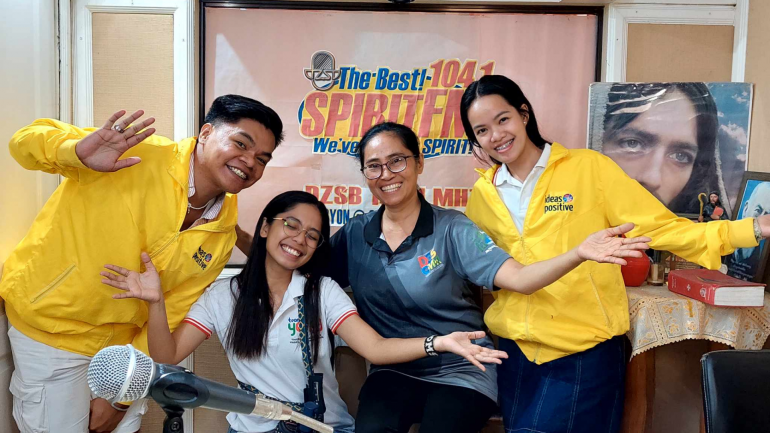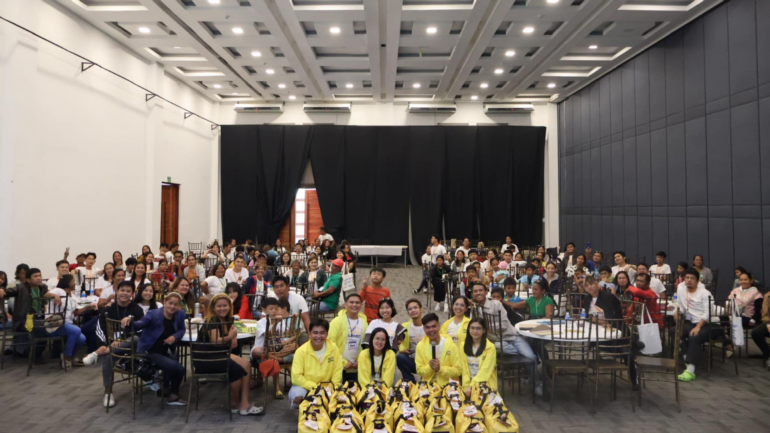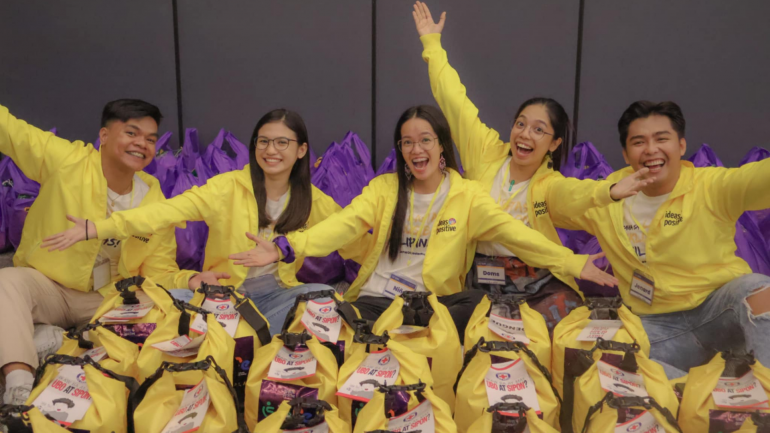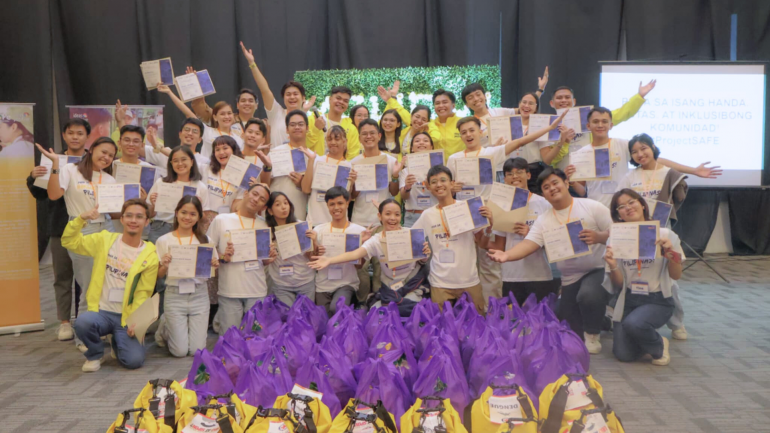Youth leaders champion disaster preparedness for PWDs
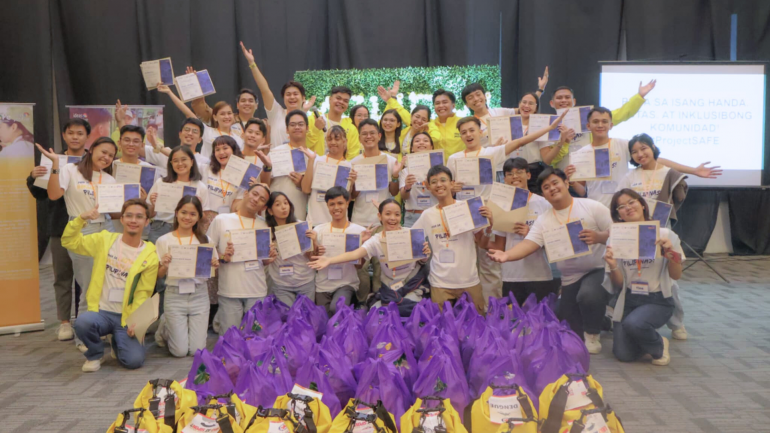
Leoncia has been mothering her two children with disabilities: an 18-year-old bedridden daughter with a physical disability and a seven-year-old son with a visual disability.
With her husband working far from home, she once had to call relatives from another municipality to help them evacuate during a typhoon to the city proper, taking almost an hour to travel from their home.
This is one of the stories that youth leaders in “Team Yehey” (hurray in English) gathered from the grounds that inspired them to champion disaster preparedness for Persons with Disabilities (PWDs) whom they wish to be mainstreamed and made “visible” with a project that won in Ideas Positive Run 11.
“We dream of helping build a healthier and more inclusive Philippines,” said Ace Abu.
Ideas Positive was organized by the Positive Youth Development Network and the Kabataang Resilient Network, supported by the UNILAB Foundation and United Nations International Children's Emergency Fund Philippines.
Team Yehey is composed of Abu, project head; Dominica Calivara, assistant project head; Gwyn Hernandez, secretariat; Nina Gaboy, finance head; and Jenard Paskil, media and creatives head. Four of them were graduating in college when they pursued the project.
With ages ranging from 22 to 24, they were able to mobilize 40 youth volunteers in Calapan City.
Abu also had to cut short his grieving time for the successive losses of his parents, albeit, he still graduated magna cum laude with a course on Development Communications at Batangas State University.
For Abu, Calivara, and Gaboy, “their Catholic faith helped them motivation in reaching out to communities outside the church which their families have been serving since they were children”.
Team Yehey is happy with the award because it meant “celebrating the innovative ideas of the youth for communities, and not the usual sports or pageantry.”
The keys to their successful team work? A happy disposition, sense of security in their personal and professional relationships, and gut-level communications.
“We cannot expect what we do not communicate and criticisms are taken constructively. We are best friends anyway,” said Gaboy.
Like their predecessors whom they call Ate and Kuya (older sister and brother) in Ideas Positive, getting the yellow jacket symbolically motivated them to come up with a relevant nine-month project that drives positive change.
The color of yellow signifies hope, they said.
They applied for Ideas Positive in September last year and were announced as part of the Top 20, which would proceed to the intensive screening process out of 118 entries from all over the Philippines.
Their entry was Project S.A.F.E. or Supporting Abilities, Fostering Emergency Preparedness for Persons with Disabilities which is a product of the initial needs assessment that they conducted.
After the screening process, which required the team to submit an in-depth version of their proposal, a video, and to participate in a Question and Answer portion, the team was announced as part of the Top 6 National Finalists – one in the National Capital Region, two in Luzon and one in Mindanao.
Team Yehey was awarded grand winner with their Project S.A.F.E.
Resilient and Inclusive Communities
Project S.A.F.E is a specialized training and disaster preparedness kit for PWDs of Calapan City, Oriental Mindoro that aims to address their unique needs, promotes health and foster resilience and inclusivity in disaster management.
With a grant of P200,00, they chose three pilot villages – Bucayao, Panggalaan and Buhuan.
They developed an Inclusion Disaster Map, a tool designed to guide responders by providing vital information on the locations and specific needs of PWDs during emergencies.
The team has also initiated dialogues with potential partners, conducted community assessment, and engaged with the Calapan City Federation of Persons with Disabilities and other key stakeholders.
They also presented their project to the 9th Sangguniang Panglungsod of the City of Calapan in May 14, 2024, at the Sangguniang Panglungsod Session Hall where they had the chance to meet the public servants of the city who could continue to champion the Disaster Preparedness Program for PWDs.
“There were also rejections but we were insistent and would soon return to be reconsidered, using our talents in theater. We were tireless because we were having fun,” said the group, when they were interviewed on Media Spirit Care in DZSB 104.1 Spirit FM by this author.
They also met with training providers, the Red Cross Oriental Mindoro Chapter, to come up with a manual for replication with a design tailored to the unique needs of PWDs who will be participating.
“We also gave away emergency ‘go bags’ consisting of first aid, flashlight, thermal blanket, whistle, etc. All of those were suggested by the PWDs, including the glow stick that were fit for the flood-prone villages,” said Gaboy.
Abu says they wish to sustain the project with policy dialogue and counterpart for recommendations as they bank on the supportive local government.
Like they heard from some PWDs that there were those who would not evacuate because at the congested evacuation center, there is no decent room.
They hope that in the replication of the project, other sectors like the indigenous peoples and pregnant women with their unique needs would be included.
Meantime, Leoncia is grateful. “We can go sightseeing,” she said as she received the wheelchair donated by the people and offices in Calapan City, whom Team Yehey had approached for support.
In addition to the grant, the team was able to raise P40,000 from various offices, public officials and private individuals for the project.
“We wish more villages in the province, and even in the country, will replicate the project, with Camilmil (village in Calapan) taking it on already using their funds. From the Youth Hour, many have already expressed interest and are waiting for the manual (in local dialect) from us,” said the team.
It was at #YouthHour2024 in Boracay in Aklan province that Team Yehey presented the results and outcomes of the project.
The team said the project was transformational for them. “We no longer see the PWDs below us. We used to have biases – that they cannot do this and that. But if we immerse in their stories, in their lives, we realize that we should treat them as partners, not just as beneficiaries. They have so much to give, as well. This is what it means to create an inclusive community. It may not be grand, but a life that is simple and with quality.”





